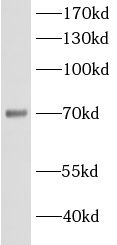| Clonality | polyclonal |
| Host | Rabbit |
| Specificity | Human, Mouse, Rat |
| Tested Application | ELISA, WB, IP |
| Delivery Time | 2 to 4 working days |
| Isotype | IgG |
| Form | liquid |
| Purification | Immunogen affinity purified |
| Purity | ≥95% as determined by SDS-PAGE |
| Uniprot ID | Q9ULC5 |
| Gene ID | |
| Calculated MW | 76 kDa |
| Ссылка на страницу на сайте производителя | ссылка |
| Инструкция | PDF |
| Storage | PBS with 0.02% sodium azide and 50% glycerol pH 7.3,-20℃ for 12 months(Avoid repeated freeze / thaw cycles.) |
| Background | Acyl-CoA synthetases(ACSL) activate long-chain fatty acids for both synthesis of cellular lipids, and degradation via beta-oxidation. ACSL5 may activate fatty acids from exogenous sources for the synthesis of triacylglycerol destined for intracellular storage(By similarity). Utilizes a wide range of saturated fatty acids with a preference for C16-C18 unsaturated fatty acids(By similarity). It was suggested that it may also stimulate fatty acid oxidation(By similarity). At the villus tip of the crypt-villus axis of the small intestine may sensitize epithelial cells to apoptosis specifically triggered by the death ligand TRAIL. May have a role in the survival of glioma cells. |
| Immunogen | acyl-CoA synthetase long-chain family member 5 |
| Synonyms | ACS2, ACS5, ACSL5, FACL5, LACS 5 |
| Recommended dilution | WB: 1:500-1:5000; IP: 1:200-1:2000 |
mouse brain tissue were subjected to SDS PAGE followed by western blot with FNab00109(ACSL5 antibody) at dilution of 1:1200
 |
| | |
